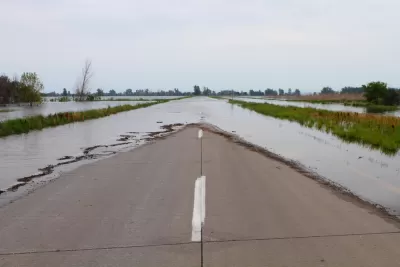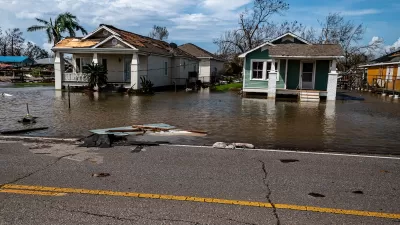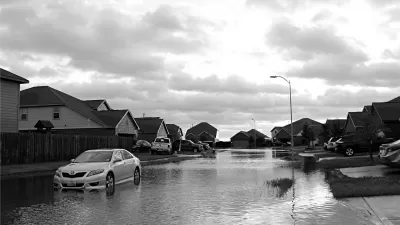The lack of disclosure laws in most states has led to an overvaluation of homes located in floodplains across the country.

Many American homeowners "remain unaware of the risks their properties face" because most states have nonexistent or inadequate flood risk disclosure laws, writes Jena Brooker for Grist. "This lack of transparency has created a false real estate market in parts of the U.S., according to new research from Stanford University and the University of North Carolina at Chapel Hill. The study, published in the journal Proceedings of the National Academies of Sciences, found there are almost 4 million single-family homes located in floodplains nationwide that collectively are overvalued by $44 billion based on their flood risk, or an average $11,526 per house."
Because land in floodplains is often cheaper, this disproportionately affects low-income families. "If you’re a household that invested a lot of money into a home in one of these places, we would be extremely concerned about the possibility of that home’s value dropping a lot and really wiping out a lot of wealth in communities that are vulnerable to begin with," says Miyuki Hino, lead author of the study and a professor at the University of North Carolina Chapel Hill. "Of the 10 states most at risk of severe flooding in the next 100 years, just three have flood risk disclosure laws — North Carolina, California, and Louisiana, according to data from the Natural Resources Defense Council."
"The scientists argue their new research isn’t just useful for studying flooding, but can also be applied to other climate change-related disasters that affect housing, including wildfires."
FULL STORY: Is your home in a flood-prone zone? In most states, you won’t find out until after you buy.

Alabama: Trump Terminates Settlements for Black Communities Harmed By Raw Sewage
Trump deemed the landmark civil rights agreement “illegal DEI and environmental justice policy.”

Study: Maui’s Plan to Convert Vacation Rentals to Long-Term Housing Could Cause Nearly $1 Billion Economic Loss
The plan would reduce visitor accommodation by 25% resulting in 1,900 jobs lost.

Why Should We Subsidize Public Transportation?
Many public transit agencies face financial stress due to rising costs, declining fare revenue, and declining subsidies. Transit advocates must provide a strong business case for increasing public transit funding.

Wind Energy on the Rise Despite Federal Policy Reversal
The Trump administration is revoking federal support for renewable energy, but demand for new projects continues unabated.

Passengers Flock to Caltrain After Electrification
The new electric trains are running faster and more reliably, leading to strong ridership growth on the Bay Area rail system.

Texas Churches Rally Behind ‘Yes in God’s Back Yard’ Legislation
Religious leaders want the state to reduce zoning regulations to streamline leasing church-owned land to housing developers.
Urban Design for Planners 1: Software Tools
This six-course series explores essential urban design concepts using open source software and equips planners with the tools they need to participate fully in the urban design process.
Planning for Universal Design
Learn the tools for implementing Universal Design in planning regulations.
Caltrans
Smith Gee Studio
Institute for Housing and Urban Development Studies (IHS)
City of Grandview
Harvard GSD Executive Education
Toledo-Lucas County Plan Commissions
Salt Lake City
NYU Wagner Graduate School of Public Service




























